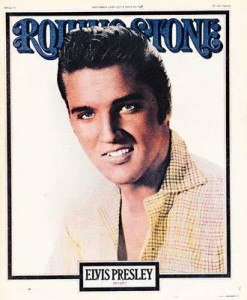Rolling Stone #248: Carole King and Navarro
Carole King and Navarro mellow out
Carole King pulls her hand off the keyboards and looks around the tiny storefront rehearsal room in disbelief. “C’mon.” she implores, “someone’s got to remember the words to “One Fine Day.’ Just one verse!”
The six young members of her new “side-by-side” band, Navarro, shrug and continue beaming. “I didn’t even know you wrote ‘Locomotion’ until the other day,” marvels one.
“You guys!” King claps her hands gleefully. “You make me feel so young. I’ll get the words later. Let’s play!”
All smiles and effervescence, Navarro bursts into an electric rendition of King’s 1975 hit, “Only Love Is Real.” There is an immediately recognizable difference in the music – this is the group spirit King has been missing in recent years. And when Navarro segues into a song of its own, “Newborn Highway,” an interesting thing happens. King joyfully reverts to the role of sideperson with grateful enthusiasm.
“Jesus,” cracks a visitor from L.A., “where can a guy find some bad vibes around here?”
Ah, but there are even more jaded questions to be answered. Like just what is such a reclusive legend as Carole King (who seven years ago recorded the most popular album in music history, Tapestry) doing with a “positive-energy” club band from Boulder.
“Okay, well, that’s quite a story,” says Navarro guitarist/songwriter/singer Mark Hallman. “But I think Carole said it best. She turned to us in the middle of the sessions for Simple Things (her new album) and said, ‘Look, let’s face it. You’re using me and I’m using you.” It’s true. We badly needed each other’s inspiration and energy.”
Right before King latched onto them, Navarro had, in fact, broken up. “We’d split up and re-formed so many times that it was a big joke around town,” says lead guitarist Robert McEntee. “But this time was for good…we thought.”
“The band had been real popular around Boulder for years, but we’d taken it as far as it could go,” adds drummer Michael Wooten. “The only other place we had a following was Detroit [where the band got its start in 1970 as a duo]. The absolute last straw was when we went back there to play this club…it was so filthy. Soot and pollution everywhere. Talk about paying dues! I had to wear a surgeon’s mask!”
Navarro returned to the relative purity of Boulder, played a few last club dates and disbanded. “We all got together and meditated in a big circle for the best to come to all of us in our separate ways. It was a great emotional experience. Finally, after all those years, we had our own lives back…and we hadn’t even made a record,” Hallman says.
Two days later, Hallman’s phone ran. It was Carole King in town to record at Caribou Studios. On the advice of Dan Fogelberg, she caught one of Navarro’s last shows. She needed a band, she said, and would soon have her own record label (Avatar, distributed by Capitol) should the group want to make records on its own. She didn’t know Navarro had broken up.
Hallman didn’t tell her. He simply began tracking down former band members, by then scattered to all parts of Colorado. Some had even started living in teepees. “We finally got everyone together,” recalls Hallman, “and had another huge meeting. This one was even more intense. We realized we had gotten exactly what we had been striving and meditating for. We learned that if you focus yourself, you can achieve anything you want.”
It is certainly hard to argue that philosophy with Navarro. They quickly gained studio experience while working on Simple Things and another unreleased King/Navarro LP owned by her former label, Ode. They then put that experience to work on their own debut LP, Listen. A sizable record deal later, they are suddenly prosperous young musicians. And all without ever having been on a national concert tour. (“Do they really yell ‘boogie!’ everywhere you go? percussionist Miguel Rivera asks wonderously.)
After nearly ten years of incredible success in every facet of the music business, Carole King, 35, has quietly gone through a momentous upheaval herself. By her own choice, she started over last year, without the security of longtime manager/producer/Ode President Lou Adler. Assisted now only by a new manager, Boulder-based Patrick Cullie, and her fiance/sometime songwriting partner, Rick Evers, King calls the shots from a new home in the wilds of Utah.
King, of course, hasn’t done an in-depth interview in nine years. “I have a right to my private life,” she explains, “and my greatest dream has always been to let the music speak for itself.” These days, however, she does not hesitate to talk about Navarro, and the joy they bring each other. They all clasp hands and meditate together in “the circle,” as they call it, before every session or show. In concert, she opens solo, slowly introducing musicians until she’s left her audience in Navarro’s hands. “I have never been happier with a band,” she says simply.
“I sometimes wonder why Carole King chose to throw all her support behind us,” admits flute and sax player Richard Hardy. “She doesn’t need to make money and she doesn’t even like to tour that much. But she loves the music and loves to play. If we make it on our own, she knows she can always fly out and slip onstage with us anytime…She would crave a situation like that.”
And how’s Navarro’s longevity forecast these days? “Great!” replies bassist Rob “Poonah” Galloway. “It’s a whole new situation…there’s no problem we can’t all work out at the frozen yogurt stand.”
Courtesy of Rolling Stone #248 – Cameron Crowe – September 22, 1977


